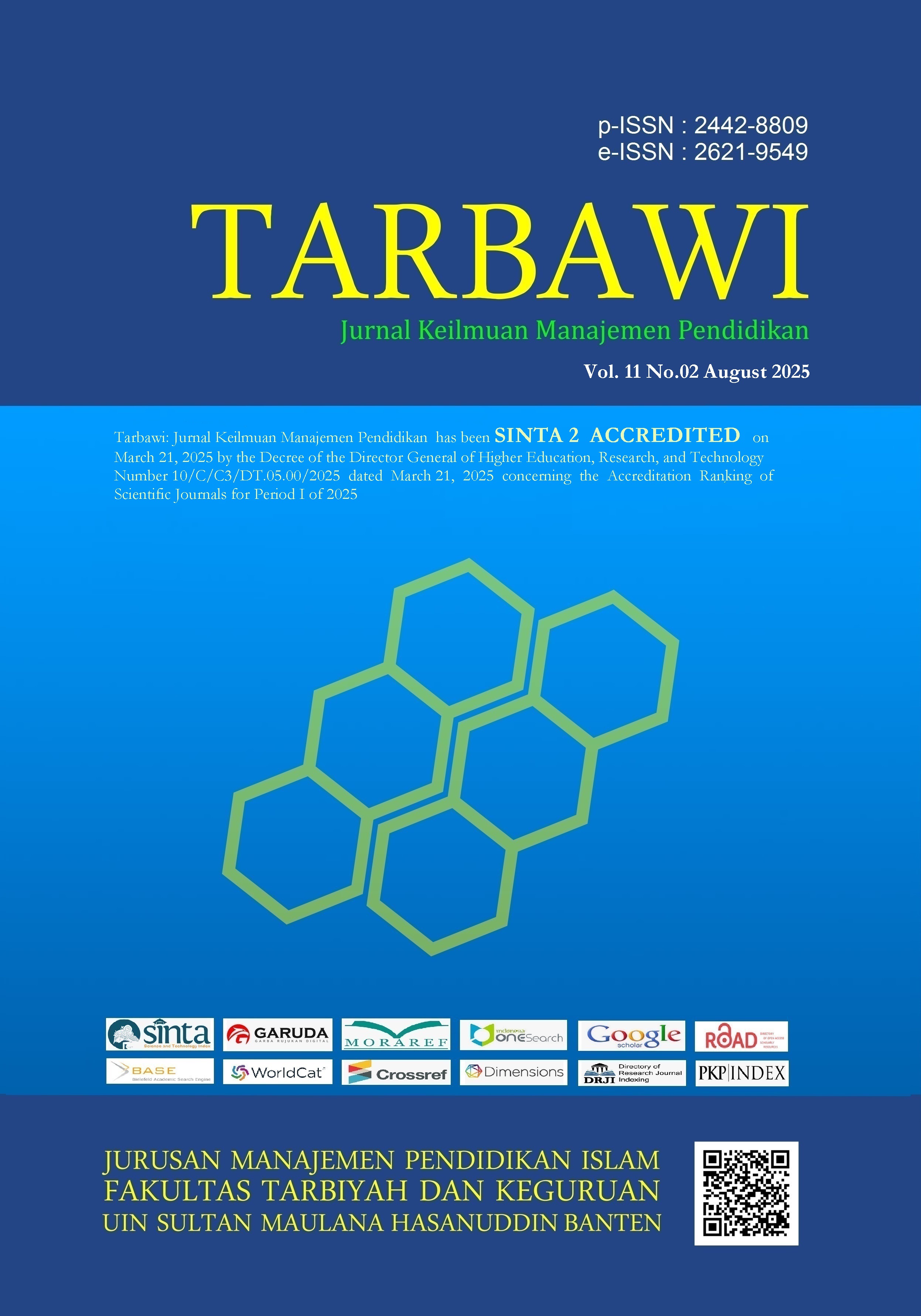Event-Based Planning for Multicultural Education in Vocational High Schools: Evidence from Bakti Karya Parigi Pangandaran, Indonesia
 DOI:
DOI:
https://doi.org/10.32678/tarbawi.v11i02.11511
 Abstrak viewed : 144 times
|
Abstrak viewed : 144 times
|  PDF (English) downloaded : 66 times
PDF (English) downloaded : 66 times
Kata Kunci:
Event Management, Multicultural Education, Planning, Vocational High SchoolAbstrak
This study aims to explore effective planning strategies for multicultural education through an event management framework at Bakti Karya Parigi Vocational High School (SMK). Using a qualitative research approach with grounded theory methodology, this study employs a case study design. Data were collected through in-depth interviews with the school principal, teachers, students, and stakeholders; participant observation during the planning and implementation of school events; and document analysis. Data were managed and analyzed using ATLAS—ti software. The findings reveal that SMK Bakti Karya Parigi adopts event management as a holistic educational strategy to instill multicultural values. The school systematically plans and implements activities that introduce cultural diversity and build students' character and competencies for a multicultural society. This study concludes that event management principles—such as idea exploration, resource planning, collaboration, financial management, targeted promotion, and operational planning—can be effectively integrated into multicultural education. This finding recommends that vocational schools adopt event-based strategies as a sustainable model for fostering inclusivity and intercultural competence in diverse educational environments.
Unduhan
Referensi
Acquah, E. O., & Commins, N. L. (2017). Methods that matter in addressing cultural diversity with teacher candidates. Teaching in Higher Education, 22(5), 501-518. https://doi.org/10.1080/13562517.2016.1273217
Aderibigbe, S. A., Idriz, M., Alzouebi, K., AlOthman, H., Hamdi, W. B., & Companioni, A. A. (2023). Fostering tolerance and respect for diversity through the fundamentals of Islamic education. Religions, 14(2), 212. https://doi.org/10.3390/rel14020212
Arifin, S. (2019). Populisme, Demokratisasi, Multikulturalisme. Intrans Publishing.
Bagdigen, M. (2001). Budgeting systems and their applicability in public sector. Erciyes Üniversitesi İktisadi ve İdari Bilimler Fakültesi Dergisi, (17), 17-36. https://dergipark.org.tr/en/pub/erciyesiibd/issue/38176/444486
Banks, J. A., & Banks, C. A. M. (2010). Multicultural education: Issues and perspectives. John Wiley & Sons.
Barokad, B., & Sunarto, S. (2021). Manajemen pengembangan kegiatan ekstrakurikuler karawitan dalam konteks pendidikan karakter berbasis kearifan lokal. Media Manajemen Pendidikan, 4(1), 104-116. https://doi.org/10.30738/mmp.v4i1.8967
Bray, M. (2003). Community initiatives in education: Goals, dimensions and linkages with governments. Compare: A Journal of Comparative and International Education, 33(1), 31-45. https://doi.org/10.1080/03057920302598
Charmaz, K. (2014). Constructing Grounded Theory (introducing qualitative methods series). Constr. Grounded Theory.
Clark, S. G., & Wallace, R. L. (2015). Integration and interdisciplinarity: concepts, frameworks, and education. Policy Sciences, 48, 233-255. https://doi.org/10.1007/s11077-015-9210-4
Deles, P., Mendoza, R. U., & Vergara, G. (2010). Social budgeting initiatives and innovations: Insights using a public finance lens. In Background Paper Prepared for The African Child Policy Forum.
Dewantara, J. A. (2024). Realitas sosial: dalam prespektif pembangunan sosial budaya di era globalisasi untuk mewujudkan pendidikan warga multikultural. Jurnal Kewarganegaraan, 8(2), 1415-1422. https://doi.org/10.31316/jk.v8i2.6555
Ding, Y., Zhang, L., & Wang, C. (2020). Innovation and entrepreneurship education in event management: Case studies from Chinese universities. Events: Future, trends, perspectives, 271-293.
Dowson, R., Albert, B., & Lomax, D. (2022). Event planning and management: Principles, planning and practice. Kogan Page Publishers.
Epstein, J. L. (2011). School, family, and community partnerships: preparing educators and improving schools. Routledge.
Firdaus, F. A., & Mariyat, A. (2017). Humanistic approach in education according to Paulo Freire. At-Ta’dib, 12(2), 25. http://dx.doi.org/10.21111/at-tadib.v12i2.1264
Gorski, P. C. (2009). What we're teaching teachers: An analysis of multicultural teacher education coursework syllabi. Teaching and teacher education, 25(2), 309-318. https://doi.org/10.1016/j.tate.2008.07.008
Hallahan, K., Holtzhausen, D., Van Ruler, B., Verčič, D., & Sriramesh, K. (2007). Defining strategic communication. International journal of strategic communication, 1(1), 3-35. https://doi.org/10.1080/15531180701285244
Hero, L. M., & Lindfors, E. (2019). Students’ learning experience in a multidisciplinary innovation project. Education+ Training, 61(4), 500-522. https://doi.org/10.1108/ET-06-2018-0138
Huxham, C., & Vangen, S. (2013). Managing to collaborate: The theory and practice of collaborative advantage. Routledge.
Kelley, C. (2024). Fostering Compassion and Empathy: The Role of Humane Education in Early Childhood. Childhood Education, 100(6), 12-17. https://doi.org/10.1080/00094056.2024.2425261
Mamlok, D. (2023). The quest to cultivate tolerance through education. Studies in Philosophy and Education, 42(3), 231-246. https://doi.org/10.1007/s11217-023-09874-8
Mardhiah, M., Ginting, D., Mumfangati, T., Meisuri, M., Fatmawati, E., Jannah, M., ... & Saputra, N. (2024). Internalization of multicultural education in improving students’ multicultural competence. Journal of Education and Health Promotion, 13(1), 204. https://doi.org/10.4103/jehp.jehp_1206_23
Maulidiah, R. H., Nisa, K., Rahayu, S., Irma, C. N., & Fitrianti, E. (2023). Multicultural education values in the Indonesian textbooks: A critical discourse analysis. Theory and Practice in Language Studies, 13(3), 624-635. https://doi.org/10.17507/tpls.1303.11
Nieto, S. (2015). The light in their eyes: Creating multicultural learning communities. Teachers College Press.
Pamilasari, D. D. (2019). Pelaksanaan program ekstrakurikuler karawitan di sekolah berbasis budaya sekolah dasar. E-Jurnal Skripsi Program Studi Teknologi Pendidikan, 8(4), 315-324. https://journal.student.uny.ac.id/fiptp/article/view/16247
Prasetiawati, E. (2017). Urgensi Pendidikan Multikultur untuk Menumbuhkan Nilai Toleransi Agama di Indonesia. Tapis: Jurnal Penelitian Ilmiah, 1(02), 272-303. https://doi.org/10.32332/tapis.v1i02.876
Qadir, H., & Islam, N. U. (2023). An Integrated Approach of Multiculturalism and Religious Diversity. In The Role of Faith and Religious Diversity in Educational Practices (pp. 188-204). IGI Global. https://doi.org/10.4018/978-1-6684-9184-3.ch009
Raj, R., Walters, P., & Rashid, T. (2008). Events Management: An Integrated and Practical Approach. Sage.
Rose, D. H., & Meyer, A. (2002). Teaching every student in the digital age: universal design for learning. ASCD.
Shone, A., & Parry, B. (2016). Successful Event Management: A Practical Handbook (4th ed.). Cengage Learning EMEA
Supriyatno, T., & Ubabuddin, U. (2020). Internalization of multicultural values in learning Islamic education. International Journal of Innovation, Creativity and Change, 13(10), 1738-1751. https://digitalcommons.unl.edu/libphilprac/3742/
Urbiola, A., Ruiz-Romero, J., Willis, G. B., & Moya, M. (2020). Beyond the political concept: the psychosocial effects of the multicultural perspective. Andamios, 17(44), 295-314. https://doi.org/10.29092/uacm.v17i44.802
##submission.downloads##
Diterbitkan
Cara Mengutip
Terbitan
Bagian
Lisensi
Hak Cipta (c) 2025 Irpan Ilmi, Dian Dian, Hasan Basri, Ajid Thohir

Artikel ini berlisensiCreative Commons Attribution-ShareAlike 4.0 International License.







.jpg)



